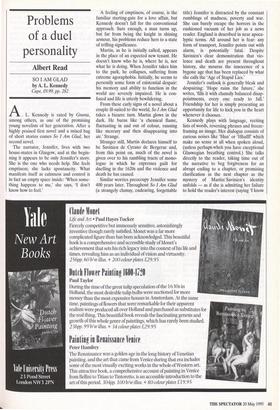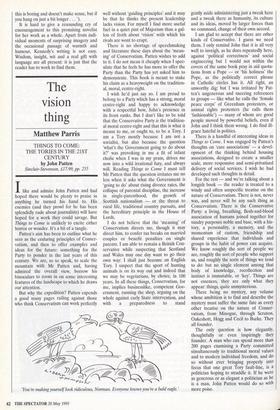Problems of a duel personality
Albert Read
SO I AM GLAD by A. L. Kennedy Cape, £9.99, pp. 282 A. L. Kennedy is rated by Granta, among others, as one of the promising young novelists of her generation. After a highly praised first novel and a mixed bag of short stories comes So I Am Glad, her second novel.
The narrator, Jennifer, lives with two house-mates in Glasgow, and at the begin., ning it appears to be only Jennifer's story. She is the one who needs help. She feels emptiness; she lacks spontaneity. What manifests itself as calmness and control is in fact an empty space inside: 'When some- thing happens to me,' she says, 'I don't know how to feel.' A feeling of emptiness, of course, is the familiar starting-gate for a love affair, but Kennedy doesn't fall for the conventional approach. Sure enough, a man turns up, but far from being the knight in shining armour, his problems reduce hers to a state of trifling significance.
Martin, as he is initially called, appears in the place of an expected new tenant. He doesn't know who he is, where he is, nor what he is doing. When Jennifer takes him to the park, he collapses, suffering from extreme agoraphobia. Initially, he seems to personify some form of existential despair: his memory and ability to function in the world are severely impaired. He is con- fused and life is utterly bewildering.
From these early signs of a novel about a couple ill-suited to the world, So I Am Glad takes a bizarre turn. Martin glows in the dark. He burns like 'a chemical flame, fluctuating in and out of colour, running like mercury and then disappearing into air.' Strange.
Stranger still, Martin declares himself to be Savinien de Cyrano de Bergerac and, from this point on, much of the novel is given over to his rambling tracts of mono- logue in which he expresses guilt for duelling in the 1620s and the violence and death he has caused.
Similar worries preoccupy Jennifer some 400 years later. Throughout So I Am Glad (a strangely clumsy, endearing, forgettable title) Jennifer is distracted by the constant rumblings of madness, poverty and war. She can barely escape the horrors in the cushioned vacuum of her job as a news reader. England is described in near apoca- lyptic terms. All around her is fear: any form of transport, Jennifer points out with alarm, is potentially fatal. Despite Savinien's clear demonstration that vio- lence and death are present throughout history, she mourns the innocence of a bygone age that has been replaced by what she calls the 'Age of Stupid Lies.'
Jennifer's outlook is generally bleak and despairing: 'Hope ruins the future,' she writes, 'fills it with clumsily balanced disap- pointments, every one ready to fall.' Friendship for her is simply presenting an opportunity for life to kickyou in the heart whenever it chooses.
Kennedy plays with language, reciting lists of words, reversing phrases and freeze- framing an image. Her dialogue consists of curious noises like 'Finn' or Ilhafff which make no sense at all when spoken aloud, (unless perhaps wheh you have exceptional Glaswegian breathing control.) She talks directly to the reader, taking time out of the narrative to beg forgiveness for an abrupt ending to a chapter, or promising clarification in the next chapter as the mystery of Martin/ Savinien's identity unfolds — as if she is admitting her failure to hold the reader's interest (saying 'I know this is boring and doesn't make sense, but if you hang on just a bit longer . . . ').
It is hard to give a resounding cry of encouragement to this promising novelist for her work as a whole. Apart from indi- vidual moments of surprising imagery and the occasional passage of warmth and humour, Kennedy's writing is not easy. Wisdom, insight, wit and a real gift with language are all present: it is just that the reader has to work to find them.



































































 Previous page
Previous page